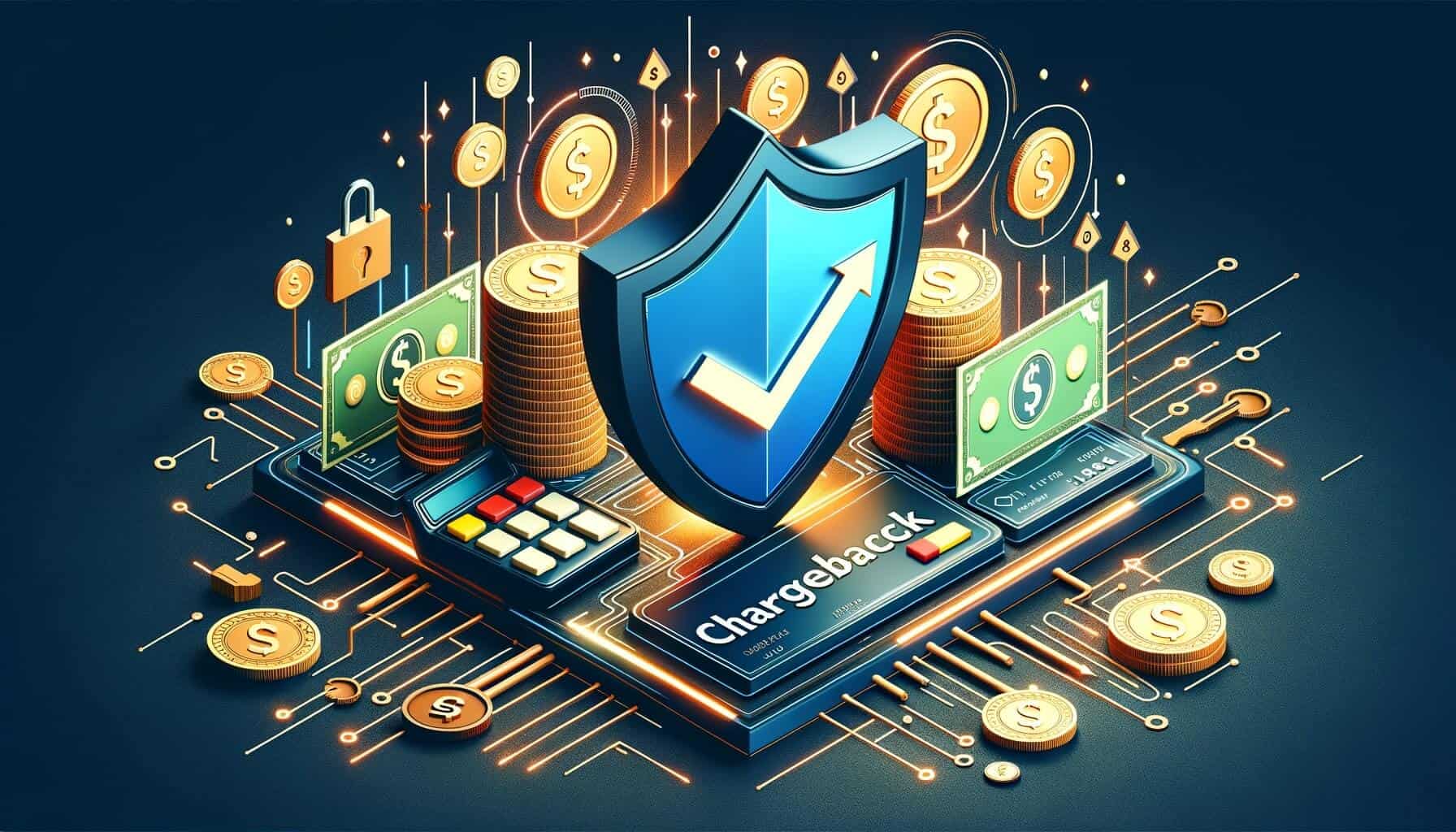
By Harriet Forster January 2, 2025
Chargeback insurance is a type of coverage that protects businesses from financial losses resulting from chargebacks. Chargebacks occur when a customer disputes a transaction and requests a refund from their bank or credit card issuer. This can happen for various reasons, such as fraud, dissatisfaction with the product or service, or unauthorized use of the customer’s card.
Understanding Chargebacks: What Are They and How Do They Work?

Chargebacks are a mechanism designed to protect consumers from fraudulent or unauthorized transactions. When a customer initiates a chargeback, the funds are temporarily taken from the merchant’s account and held by the bank or credit card issuer. The merchant is then given an opportunity to provide evidence to dispute the chargeback. If the merchant fails to provide sufficient evidence, the funds are permanently deducted from their account.
Chargebacks can be a significant problem for businesses, as they not only result in financial losses but also incur additional fees and penalties. Moreover, excessive chargebacks can damage a merchant’s reputation and lead to the termination of their merchant account.
The Importance of Chargeback Insurance for Businesses

Chargeback insurance is crucial for businesses, especially those operating in high-risk industries or dealing with a large volume of online transactions. It provides financial protection against chargebacks and helps businesses mitigate the risks associated with them.
One of the main reasons why chargeback insurance is important is that it helps businesses avoid financial losses. When a chargeback occurs, the merchant is responsible for refunding the customer, regardless of the validity of the dispute. This means that even if the merchant can successfully dispute the chargeback, they still lose the revenue from the transaction and may incur additional fees.
It also helps businesses maintain their cash flow. When a chargeback is initiated, the funds are temporarily held by the bank or credit card issuer, which can disrupt the merchant’s cash flow. With chargeback insurance, businesses can receive immediate reimbursement for the disputed amount, allowing them to continue operating without any financial setbacks.
Furthermore, it provides businesses with peace of mind. By having coverage in place, merchants can focus on running their business and serving their customers, knowing that they are protected against chargebacks. This can help reduce stress and allow businesses to allocate their resources more effectively.
How Does Chargeback Insurance Work?
- Assessing the business’s needs: The first step in obtaining chargeback insurance is to assess the business’s needs. This includes evaluating the volume of transactions, the average ticket size, and the industry in which the business operates. This information helps determine the appropriate coverage and policy limits.
- Researching chargeback insurance providers: Once the business’s needs are identified, it is important to research and compare different providers. Factors to consider include coverage limits, deductibles, premiums, claim processes, and reputation.
- Applying for chargeback insurance: After selecting a provider, the business needs to complete an application form. The application typically requires information about the business, such as its name, address, industry, and financial history.
- Underwriting process: Once the application is submitted, the provider will review it and assess the business’s risk profile. This may involve analyzing the business’s financial statements, transaction history, and chargeback ratios. Based on this evaluation, the provider will determine the premium and coverage limits.
- Policy issuance: If the application is approved, the chargeback insurance provider will issue a policy outlining the terms and conditions of the coverage. The policy will specify the coverage limits, deductibles, premiums, and any exclusions or limitations.
- Payment of premiums: The business is required to pay the premiums as specified in the policy. The premiums can be paid monthly, quarterly, or annually, depending on the agreement with the chargeback insurance provider.
- Chargeback occurrence: If a chargeback occurs, the business needs to notify the provider immediately. The provider will guide the business through the claim process, which typically involves providing documentation and evidence to support the claim.
- Claim evaluation: The insurance provider will evaluate the claim based on the documentation provided by the business. This may include receipts, shipping information, communication records, and any other evidence that proves the legitimacy of the transaction.
- Reimbursement: If the claim is approved, the chargeback insurance provider will reimburse the business for the amount of the chargeback and any associated costs, such as fees and penalties imposed by payment processors.
- Policy renewal: Insurance policies are typically valid for a specific period, such as one year. At the end of the policy term, the business can choose to renew the policy by paying the premiums for the next term.
Choosing the Right Chargeback Insurance Provider: Factors to Consider

When selecting a chargeback insurance provider, businesses should consider several factors to ensure they choose the right one for their needs. Here are some key factors to consider:
- Coverage limits: Businesses should assess their transaction volume and average ticket size to determine the appropriate coverage limits. It is important to choose a chargeback insurance provider that offers coverage limits that align with the business’s needs.
- Deductibles: Deductibles are the amount that the business is responsible for paying before the insurance coverage kicks in. Businesses should consider their financial capabilities and choose a deductible that they can comfortably afford.
- Premiums: Premiums are the amount that the business needs to pay for the insurance coverage. It is important to compare premiums from different providers and choose one that offers competitive rates without compromising on coverage.
- Claim process: Businesses should inquire about the claim process of the insurance provider. It is important to choose a provider that has a streamlined and efficient claim process, as this can significantly impact the speed and ease of reimbursement.
- Reputation: Researching the reputation of the insurance provider is crucial. Businesses should read reviews, testimonials, and ratings to gauge the provider’s reliability, customer service, and claim settlement history.
- Exclusions and limitations: It is important to carefully review the terms and conditions of the chargeback insurance policy to understand any exclusions or limitations. Some policies may exclude certain industries or types of chargebacks, so businesses should ensure that the policy covers their specific needs.
The Benefits of Chargeback Insurance for Merchants
Chargeback insurance offers several benefits for both merchants and consumers. Here are some key benefits:
Benefits for merchants:
- Financial protection: Chargeback insurance provides merchants with financial protection against chargebacks, reimbursing them for the amount of the chargeback and associated costs.
- Improved cash flow: By reimbursing merchants for chargebacks, insurance helps maintain a steady cash flow, preventing disruptions caused by funds being taken from the merchant’s account.
- Reduced administrative burden: Chargebacks can be time-consuming and require significant administrative effort to dispute. Chargeback insurance reduces the administrative burden on merchants by handling the claim process and providing reimbursement.
- Enhanced customer trust: By having insurance, merchants can demonstrate their commitment to customer satisfaction and financial responsibility. This can help build trust with customers and improve their perception of the business.
Benefits for consumers:
- Increased confidence in online transactions: Chargeback insurance provides consumers with an added layer of protection when making online transactions. Knowing that they are covered by insurance can increase their confidence in the transaction and reduce the risk of fraudulent or unauthorized charges.
- Ease of dispute resolution: If a consumer encounters a problem with a transaction, chargeback insurance simplifies the dispute resolution process. Consumers can initiate a chargeback and rely on the insurance provider to handle the claim and provide reimbursement if necessary.
- Protection against fraud: Chargeback insurance protects consumers from fraudulent transactions by allowing them to request a chargeback and receive a refund if they suspect unauthorized use of their credit card or if they are victims of identity theft.
Common Misconceptions about Chargeback Insurance
There are several common misconceptions about chargeback insurance that need to be addressed:
1. Chargeback Insurance Eliminates the Need for Effective Fraud Prevention: While chargeback insurance provides financial protection against chargebacks, it does not eliminate the need for effective fraud prevention measures. Businesses should still implement robust fraud prevention strategies to minimize the risk of chargebacks.
2. Chargeback Insurance Covers All Chargebacks: This insurance typically covers only a portion of the chargeback amount, up to a certain limit. Merchants are still responsible for refunding the customer for the remaining amount.
3. Chargeback Insurance Is Expensive: The cost of insurance varies depending on the provider and the specific policy. While it can be an additional expense for businesses, it is important to consider the potential financial losses from chargebacks and the peace of mind that insurance provides.
4. Chargeback Insurance Is Only for High-Risk Industries: While chargeback insurance is particularly beneficial for businesses operating in high-risk industries, such as e-commerce or travel, it can also provide value for businesses in other industries. Any business that accepts card payments is susceptible to chargebacks and can benefit from chargeback insurance.
Frequently Asked Questions
Q1. What is the difference between chargeback insurance and fraud prevention?
Chargeback insurance provides financial protection against chargebacks, while fraud prevention focuses on minimizing the risk of fraudulent transactions. While both are important for businesses, they serve different purposes.
Q2. Can chargeback insurance prevent chargebacks?
Chargeback insurance does not prevent chargebacks but provides financial protection against them. To prevent chargebacks, businesses should implement effective fraud prevention measures and provide excellent customer service.
Q3. How much does chargeback insurance cost?
The cost of this insurance varies depending on the provider and the specific policy. It is important to compare different providers and consider the potential financial losses from chargebacks when evaluating the cost.
Q4. Can chargeback insurance cover all chargebacks?
Chargeback insurance typically covers only a portion of the chargeback amount, up to a certain limit. Merchants are still responsible for refunding the customer for the remaining amount.
Q5. Is chargeback insurance necessary for all businesses?
While this insurance is particularly beneficial for businesses operating in high-risk industries or dealing with a large volume of online transactions, it can provide value for businesses in other industries as well. Any business that accepts card payments is susceptible to chargebacks and can benefit from chargeback insurance.
Conclusion
Chargeback insurance is a valuable tool for businesses to protect themselves against the financial risks associated with chargebacks. By understanding how chargebacks work, the importance of this insurance, and the factors to consider when choosing a provider, businesses can make informed decisions and effectively manage chargebacks.
While this insurance does not eliminate the need for effective fraud prevention measures, it provides financial protection, peace of mind, and the ability to maintain cash flow. By debunking common misconceptions and addressing frequently asked questions, businesses can gain a comprehensive understanding of chargeback insurance and its benefits.